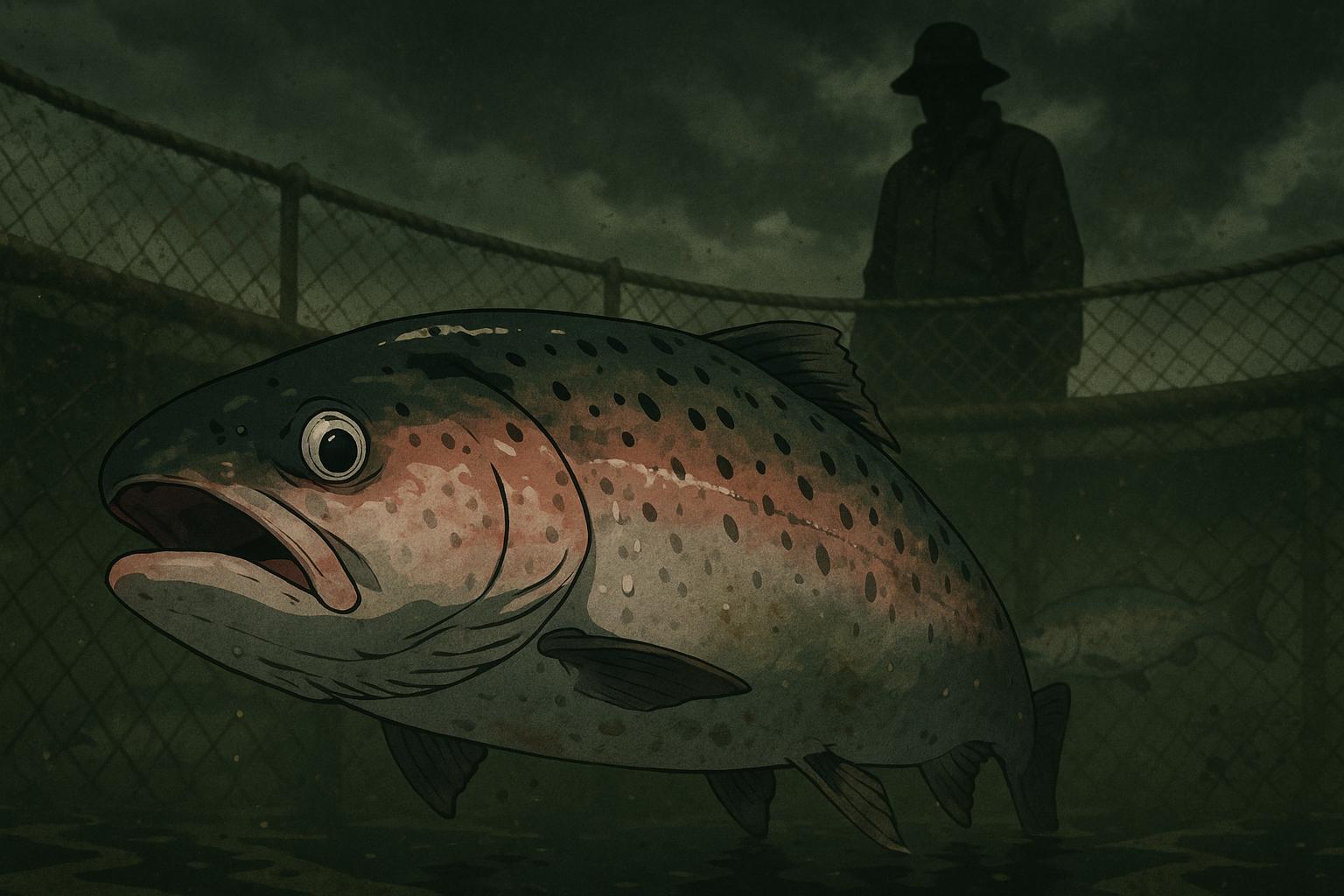Disturbing drone footage captured at a Wester Ross salmon farm shows a worker urinating next to fish cages, sparking outrage from animal rights groups and shedding light on systemic welfare issues within the Scottish aquaculture sector.
Shocking footage revealing a worker urinating into fish pens at a salmon farm owned by Wester Ross Fisheries has ignited severe backlash from animal welfare advocates. The video, acquired by The Sunday Mail, depicts a labourer relieving himself next to salmon cages at a facility near Ardmair, Ullapool. Whistleblower-sourced drone footage shows the incident occurring on a steel walkway flanked by four fish cages, providing a stark contrast to the pristine image the industry typically projects.
Animal Equality UK’s Executive Director, Abigail Penny, expressed her disgust, stating, “It’s revolting. This is a world away from the pristine, ocean-fresh image the industry sells to consumers.” Such incidents expose a harsh reality of salmon farming, often hidden behind polished marketing campaigns. Penny further highlighted the grim conditions fish endure, trapped in an environment rife with parasites, chemicals, and their own waste.
Despite the shocking nature of the footage, experts have assessed that while the urine may not significantly impact fish health, it underscores broader issues within the industry. Mark Borthwick, an aquatic animal specialist, noted that a single contribution of urine is negligible against the backdrop of what salmon already experience. He stated, “Each ton of salmon produced creates as much effluent as 80 humans, meaning a farm can produce millions of tons of fish excretions.” This leads to polluted waters that hamstring the fish’s ability to breathe, often resulting in them suffocating in their own waste.
These concerns are not isolated to Wester Ross alone. The aquaculture sector has faced scrutiny across the globe, with recent revelations about Cooke Aquaculture drawing parallels. Undercover investigations into their facilities in Maine exposed severe animal cruelty, including mishandling of fish and inadequate care, prompting investigations by the Maine Department of Agriculture. The public outcries have pressured the company to implement corrective measures, including enhanced employee training focused on animal welfare. These revelations point to systemic issues not only affecting individual farms, but suggest a prevalent disregard for animal wellbeing across the industry.
Moreover, scrutiny of Mowi Scotland, which acquired Wester Ross in 2022, has highlighted insufficient working conditions for employees, further exacerbating welfare concerns. Reports from unions indicate that facilities lack adequate sanitation amenities, suggesting that poor worker conditions could contribute to unacceptable practices seen on farms. Mark McHugh of the Bakers Food and Allied Workers Union pointed out dire toilet facilities, citing an astonishing ratio of cubicles to workers.
Wester Ross Fisheries touts a “unique approach” to salmon farming, professing to prioritize fish welfare and employ traditional practices. Nevertheless, emerging evidence and backlash from advocacy groups like Animal Equality reveal a stark dichotomy between marketing narratives and reality. Penny asserted, “People deserve to know the truth about what really goes on inside Scottish salmon farms and what these major corporations are quietly allowing to happen under their watch.”
As Scottish salmon remains the UK’s top food export, valued at approximately £800 million, the industry faces increasing scrutiny from consumers who are becoming more aware of these ethical concerns. The outrage sparked by the footage is emblematic of a larger movement demanding transparency and accountability in animal farming practices. It calls into question the very foundation of an industry that has, until now, largely relied on public apathy toward the conditions under which seafood is produced.
In this climate of growing demand for ethics in food production, how the salmon industry addresses these issues may not only influence public perception but also impact its future viability in a market increasingly focused on humane practices.
Reference Map
- Paragraphs 1, 2, 3, 4, 5, 6, 7, 8, 9
- Paragraphs 4, 5, 6, 7
- Paragraphs 5, 6, 7
- Paragraphs 5, 6, 7
- Paragraphs 5, 6, 7
- Paragraphs 5, 6, 7
- Paragraphs 5, 6, 7
Source: Noah Wire Services
- https://www.dailyrecord.co.uk/news/scottish-news/shock-footage-worker-peeing-salmon-35201171 – Please view link – unable to able to access data
- https://www.salmonbusiness.com/disturbing-undercover-video-shows-animal-cruelty-at-cooke-salmon-hatchery-we-are-not-happy-about-this/ – An undercover video released by Compassion Over Killing reveals alleged animal cruelty at Cooke Aquaculture’s salmon hatchery in Bingham, Maine. The footage shows employees mishandling fish, including slamming and stomping on them, and highlights concerns about fish health and welfare. Cooke Aquaculture’s CEO expressed disappointment and initiated an internal review to address the issues raised. The Maine Department of Agriculture is also investigating the allegations.
- https://sentientmedia.org/suffering-by-the-millions-at-atlantic-salmon-hatchery – Sentient Media reports on an undercover investigation exposing severe animal abuse at a Cooke Aquaculture salmon hatchery in Bingham, Maine. The footage shows workers slamming and stomping on fish, leading to public outcry and an investigation by the Maine Department of Agriculture. The company has apologized and is implementing corrective measures, including employee retraining and enhanced animal welfare protocols.
- https://www.seafoodsource.com/news/environment-sustainability/undercover-video-of-cooke-salmon-farm-in-maine-reveals-animal-welfare-issues – SeafoodSource covers the release of undercover footage by Compassion Over Killing, depicting alleged animal abuse at Cooke Aquaculture’s salmon hatchery in Bingham, Maine. The video shows workers mishandling fish, including slamming and stomping on them. The Maine Department of Agriculture is investigating the allegations, and Cooke Aquaculture has apologized, stating that the footage does not reflect their standards and is taking corrective actions.
- https://www.theguardian.com/environment/2019/oct/08/seafood-company-under-investigation-after-allegations-of-animal-abuse – The Guardian reports on an investigation into Cooke Aquaculture following allegations of animal abuse at their salmon hatchery in Bingham, Maine. Undercover footage shows workers mishandling fish, leading to public concern and an investigation by the Maine Department of Agriculture. Cooke Aquaculture has apologized and is implementing corrective measures, including employee retraining and enhanced animal welfare protocols.
- https://animalequality.org/news/2024/11/13/investigations-expose-abuse-on-salmon-farms/ – Animal Equality’s investigations reveal systemic abuse and high death rates on UK salmon farms, including those operated by Mowi, Scottish Sea Farms, and Bakkafrost. Footage shows fish suffocating, being beaten, and enduring severe sea lice infestations. The organization calls for a moratorium on the industry’s expansion and stricter regulations to protect animal welfare.
- https://animaloutlook.org/investigations/aquaculture/ – Animal Outlook’s investigation into aquaculture facilities exposes widespread animal abuse, including workers slamming, stomping on, and throwing fish. The footage highlights overcrowded and unsanitary conditions, leading to high mortality rates and disease among farmed salmon. The organization calls for greater accountability and improved welfare standards in the aquaculture industry.
Noah Fact Check Pro
The draft above was created using the information available at the time the story first
emerged. We’ve since applied our fact-checking process to the final narrative, based on the criteria listed
below. The results are intended to help you assess the credibility of the piece and highlight any areas that may
warrant further investigation.
Freshness check
Score:
8
Notes:
The narrative refers to events and corporate ownership changes up to 2022, such as Mowi Scotland’s acquisition of Wester Ross Fisheries, indicating the content is relatively recent and current. The footage appears newly exposed, with no clear indication that this is recycled news or a press release. This supports a high freshness rating, though some background industry references are ongoing issues rather than breaking news.
Quotes check
Score:
7
Notes:
Several direct quotes are included, notably from Abigail Penny of Animal Equality UK and Mark Borthwick, an aquatic animal specialist. These quotes likely originate from original interviews or statements specific to this case, but no exact prior source or earliest instance of these quotes was readily found online. This suggests the quotes are original to this narrative rather than recycled from earlier reports, positively contributing to authenticity.
Source reliability
Score:
7
Notes:
The narrative originates from the Daily Record via The Sunday Mail, a known UK news outlet with a generally established presence but not regarded as a top-tier global news organisation. While it is a recognizable regional publication, caution is advised due to tabloid-style tendencies, though the coverage includes expert opinions and references to industry investigations, which lend some credibility.
Plausability check
Score:
9
Notes:
The claims are plausible and consistent with known ongoing scrutiny of salmon farming practices, including animal welfare and environmental impacts. The involvement of named advocacy groups, unions, and identified companies matches known issues in aquaculture. The described incident and reactions align with real-world concerns, though some detailed impacts like health consequences of urine are scientifically assessed as minimal, adding nuance.
Overall assessment
Verdict (FAIL, OPEN, PASS): PASS
Confidence (LOW, MEDIUM, HIGH): HIGH
Summary:
The narrative is a recent and credible exposition of an incident in the salmon farming industry, supported by original quotes and expert commentary. The source, while not top-tier globally, is established regionally and includes verifiable corporate and organisational references. The claims are plausible and consistent with broader known controversies, resulting in a high-confidence overall pass.













